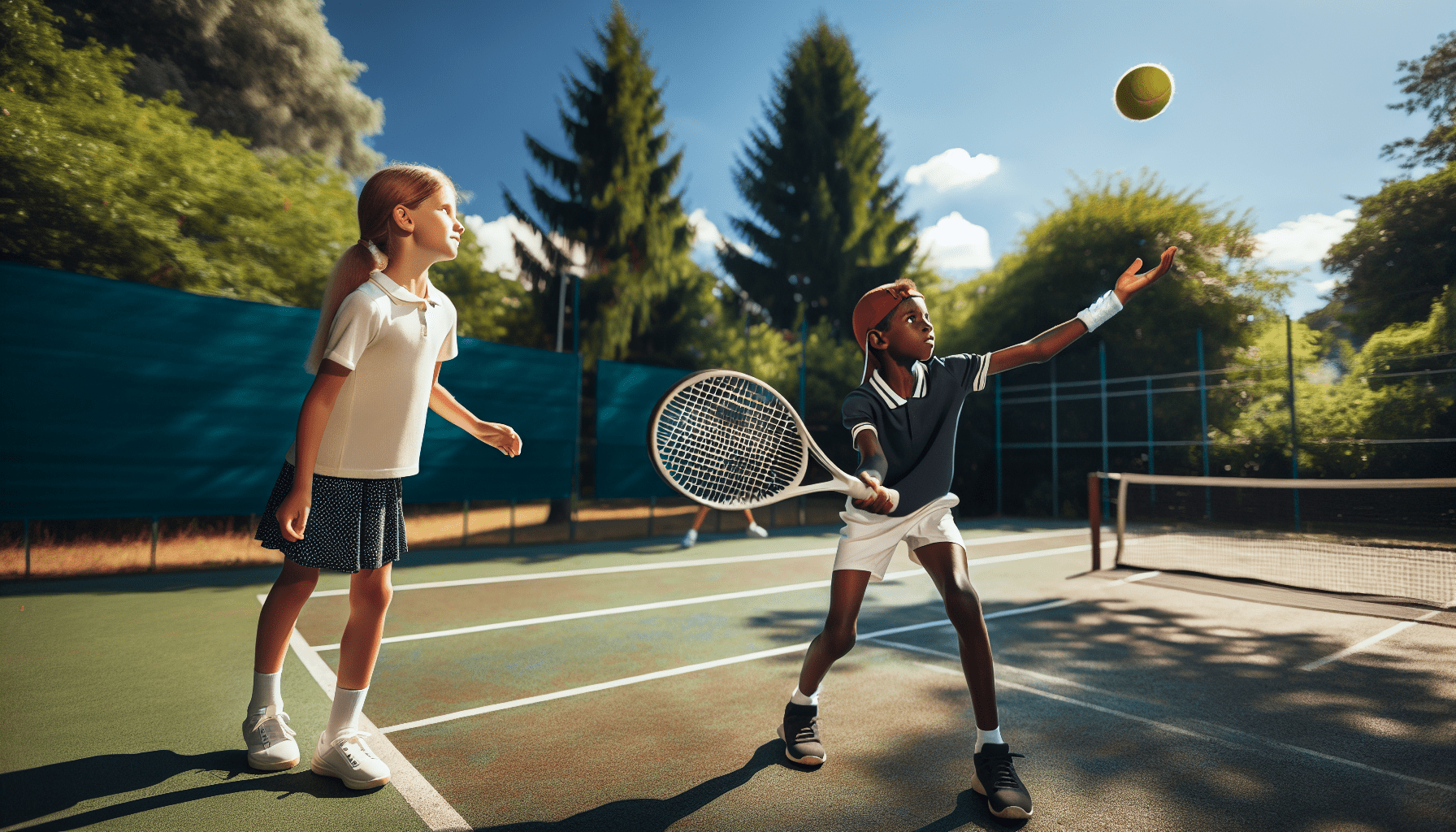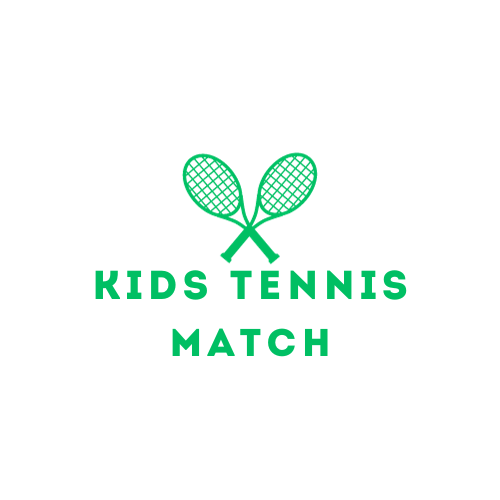Are you curious about the optimal age for children to begin playing tennis? This article explores the question, “When should kids start tennis?” Tennis is a sport that offers numerous physical and mental benefits for children, such as improved coordination, concentration, and social skills. By examining factors such as age, physical abilities, and interest, we can determine the ideal time for kids to embark on their tennis journey. So, whether you have a budding athlete at home or are simply interested in the sport, read on to discover the right age for kids to start tennis.

Physical Development
Fine Motor Skills
Fine motor skills are essential for any sport, including tennis. This refers to the ability to control small muscle movements, such as those in the fingers and hands. Developing fine motor skills enables children to hold and manipulate the tennis racket effectively. While these skills may vary among children, most kids start to develop them around three to six years old. It is crucial to provide opportunities for young children to engage in activities that promote fine motor skills, such as playing with small objects or doing puzzles.
Gross Motor Skills
Gross motor skills involve the use of large muscle groups and are essential for overall coordination and body control. In tennis, players need to run, jump, and swing their racket with ease. The development of gross motor skills usually occurs during early childhood and continues into adolescence. Children typically demonstrate improved coordination and balance around the age of four to seven. Engaging in activities like running, jumping, dancing, and playing outdoor games can help enhance these skills and lay the foundation for successful tennis playing.
Interest and Passion
Observing Interests
Before introducing your child to tennis, it is important to observe their interests and preferences. Every child is unique and has their own set of likes and dislikes. By taking the time to observe your child’s interests, you can gauge their level of enthusiasm for tennis. Look for signs of excitement when they see tennis matches on TV or when they watch others play. If your child shows curiosity and eagerness towards tennis-related activities, it might be a good time to consider introducing them to the sport.
Expressing Interest
Once you have observed your child’s interest in tennis, encourage them to express their interest and enthusiasm. Engage them in open conversations about tennis, ask them questions about what they find interesting, and listen attentively to their responses. If they show a desire to try playing tennis, provide them with opportunities to explore the sport further. This could involve joining tennis camps or programs specifically designed for young children, where they can learn the basics and develop a sense of connection with the sport.
Mental Readiness
Concentration
Tennis requires focus and concentration, as players need to quickly process visual information, react to the ball’s movement, and make strategic decisions. While the ability to concentrate varies among children, most kids start to develop basic concentration skills around the age of five or six. Before starting formal tennis training, observe whether your child can stay focused on tasks or activities for a reasonable period of time. If they demonstrate the ability to concentrate for short durations, they may be mentally ready to start learning and practicing tennis skills.
Patience
Patience is another mental skill that plays a vital role in tennis training. Learning and improving in any sport takes time, and tennis is no exception. It is important for children to understand that progress may not be immediate and that consistent effort is required to develop their skills. Gauge your child’s patience level by observing their reactions to challenges or setbacks. If they are willing to persevere and maintain a positive attitude when faced with difficulties, they may be mentally prepared to handle the ups and downs of learning tennis.
Emotional Maturity
Emotional maturity is crucial in any sport, as it involves managing one’s own emotions and understanding the emotions of others. Tennis can be both physically and mentally demanding, and children need to develop emotional resilience to cope with the pressures of competition. Assess your child’s emotional maturity by observing how they handle winning and losing, how they react to mistakes or criticism, and how they handle conflicts with their peers. If they demonstrate a level of emotional maturity and the ability to cope with various emotions, they may be ready to handle the challenges of tennis.
Social Interaction
Group Activities
Tennis provides numerous opportunities for social interaction with peers. Group activities, such as group lessons or team practices, allow children to develop communication skills, learn from one another, and build friendships within a tennis community. Before starting tennis, consider whether your child shows an interest in group activities and enjoys being around other children. If they demonstrate a positive attitude towards group settings and have the ability to cooperate with others, they may thrive in a tennis environment.
Teamwork
While tennis is typically considered an individual sport, opportunities for teamwork do exist, especially in doubles matches and team competitions. The ability to work collaboratively with a partner or team members is important for success in these situations. Observe how your child interacts with others during group activities or other team sports they may have participated in. If they show an understanding of teamwork, can communicate effectively, and work towards common goals, they may be well-suited for the collaborative aspects of tennis.

Basic Coordination
Hand-Eye Coordination
Hand-eye coordination is a fundamental skill in tennis. Players need to accurately track the ball and coordinate their hand movements to hit it with precision. The development of hand-eye coordination typically begins in early childhood and continues to improve throughout adolescence. Before starting tennis, assess your child’s hand-eye coordination by observing their ability to catch or throw objects accurately. If they demonstrate good hand-eye coordination, they may have a natural advantage in learning and excelling in tennis.
Footwork
Footwork is essential for agility and efficient movement on the tennis court. It involves coordinated movements of the feet to position the body correctly and respond to the ball’s trajectory. The development of basic footwork skills usually occurs during early childhood and progresses as children grow older. Observe how your child moves and maintains balance during activities that involve quick changes in direction, such as playing tag or dancing. If they exhibit good footwork and agility, they are likely to adapt well to the movement demands of tennis.
Equipment and Facilities
Age-Appropriate Rackets
Using age-appropriate rackets is crucial to ensure that young children can handle the equipment correctly and safely. Tennis rackets come in various sizes and weights, specifically designed to suit different age groups. Before introducing your child to tennis, consult with a tennis equipment specialist or coach to determine the appropriate racket size for their age and physical abilities. Using a racket that is too heavy or too large can hinder their progress and potentially lead to injury.
Court Size and Surfaces
Like rackets, tennis courts come in different sizes to accommodate different skill levels and age groups. For young children, smaller court sizes and modified court markings are used to make the game more accessible and enjoyable. These modified court sizes allow children to cover the court more efficiently, build confidence, and develop essential tennis skills. Research local tennis facilities or programs that offer age-appropriate court sizes and surfaces suitable for young beginners. Playing on appropriately sized courts will contribute to a positive learning experience for your child.
Physical Fitness
Endurance
Tennis demands endurance, as matches can be physically demanding and last for extended periods. Before starting formal tennis training, evaluate your child’s endurance by observing their stamina during activities that require continuous movement, such as running or playing games. If they demonstrate the ability to sustain physical activity for extended periods without excessive fatigue, their endurance level is likely sufficient to engage in tennis practices and matches.
Agility
Agility is crucial in tennis, as players need to swiftly change direction, react to the ball’s movement, and adjust their positioning on the court. Assess your child’s agility by observing their ability to move quickly and change directions smoothly during activities like tag or obstacle courses. If they exhibit good agility and can move with ease, they are more likely to adapt well to the dynamic nature of tennis.
Ability to Follow Instructions
Listening Skills
Listening skills play a significant role in a child’s ability to follow instructions and grasp new concepts. Before introducing your child to tennis, assess their listening skills by observing how they respond to verbal instructions and whether they can stay attentive during explanations. If they demonstrate good listening skills and can follow instructions with minimal repetition, they will be able to learn and progress more effectively in tennis.
Following Directions
Following directions is an essential skill in tennis, as players need to understand and execute various techniques, strategies, and game rules. Observe your child’s ability to follow directions in different contexts, such as at home, school, or during other activities. If they consistently demonstrate the ability to understand and carry out instructions accurately and efficiently, they are likely to excel in learning and applying tennis-related instructions.
Parents’ Support and Encouragement
Motivation
Parents’ support and encouragement are vital in fostering a child’s passion and motivation for tennis. Before introducing your child to the sport, assess their motivation level by observing their eagerness and enthusiasm towards trying new activities or learning new skills. If they consistently exhibit a high level of motivation, providing them with the opportunity to explore tennis will likely fuel their enthusiasm and drive for improvement.
Time Commitment
Tennis requires a significant time commitment, both in terms of practicing and participating in matches or tournaments. Consider your family’s schedule and the availability of time for your child to engage in tennis training and competitions. Assess whether you can commit to the demands of regular practice schedules and potentially traveling for tournaments. It is important to ensure that the time commitment aligns with your child’s interests and that they can balance their tennis pursuits with other aspects of their life, such as school and extracurricular activities.
Professional Guidance
Expert Assessment
Before embarking on a tennis journey, consider seeking an expert assessment of your child’s physical abilities, coordination, and overall readiness for the sport. Consult with a qualified sports physician or pediatrician who can evaluate your child’s physical condition. Additionally, seek advice from tennis coaches or professionals who specialize in working with young players. An expert assessment will provide valuable insights and guidance on whether your child is physically and developmentally ready to start tennis.
Qualified Coaches
Choosing the right coach is crucial in ensuring your child receives proper guidance and instruction in tennis. Look for coaches who are qualified, experienced, and have a track record of working with young players. A qualified coach will focus not only on teaching tennis skills but also on fostering a positive and supportive learning environment. They will tailor their coaching methods to suit your child’s age, skill level, and individual needs. Research local tennis academies or clubs to find coaches who have the expertise and ability to nurture young tennis players effectively.
In conclusion, the ideal time for children to start tennis depends on several factors, such as their physical development, mental readiness, interest, and access to appropriate equipment and facilities. By considering these factors and seeking professional guidance, parents can make informed decisions about introducing their children to tennis. Remember, the primary focus should be on creating a positive and enjoyable experience for your child, allowing them to develop a lifelong love for the sport while fostering their physical, mental, and social growth.
